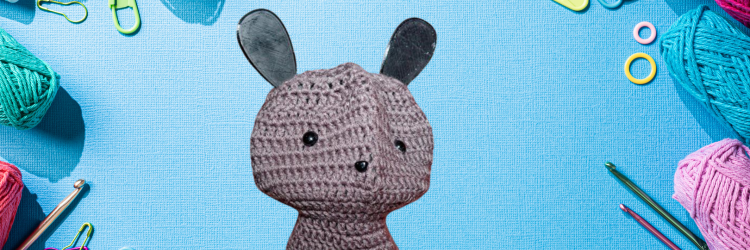
AI Accessibility: Building Robot Buddies
AI is ubiquitous. From chatbots to virtual assistants to self-driving cars, AI is transformative. It does, however, raise pressing ethical and equity questions.
How can we ensure that this powerful tool is accessible to all?
Researchers at USC developed a low-cost, accessible learning kit to help college and high school students build their own robot buddy. They can personalize the robot’s body by creating and swapping out crocheted “exteriors,” program it to mimic their head posture, and learn about AI ethics and fairness in an engaging, accessible way.
“Crafting and engineering require similar strengths like counting, planning, and spatial reasoning,” said O’Connell. “By incorporating crafting into this project, we hope to draw in creative students who might not have considered how their skills align with robotics and engineering.”
To reduce costs and development time for learners, the team customized and simplified Blossom, a small, open-source robot originally developed by Guy Hoffman at Cornell University, a co-author of the research findings. Zhonghao Shi and Allison O’Connell, the project initiators, had used Blossom for previous projects: Shi designed better AI voices for mindfulness exercises, and O’Connell programmed it to act as a study buddy for students with ADHD.
Last year, the duo began exploring ways of using the robot for educational purposes, creating a low-cost, customizable, and “human-focused” module that mirrored how students interact with technology in their everyday lives.
“Ultimately, we want to increase access to human-centered AI education for college students and create a pathway to more accessible research, said Shi, a doctoral student in computer science at the USC Interaction Lab. “We’re proposing this open-source model to not only improve education in AI for all students but also to make human-interaction research more affordable for labs and research institutions.”
As part of the project, the team developed strategies to keep costs down, using 3D printing for most of the robots’ materials. Their kits currently cost $250.
They tested the kits in a 2-day workshop with 15 undergraduate students from a local minority-serving institution. 92% of the participants believed the workshop helped them learn more about the topics covered and were inspired to study more about AI and robotics in the future. The team is now focusing on improving the high school module and plans to expand access for students at different education levels.
They presented their findings at the AAAI Conference on Artificial Intelligence, an education symposium track. The study is titled “Build Your Own Robot Friend: An Open-Source Learning Module for Accessible and Engaging AI Education.”
